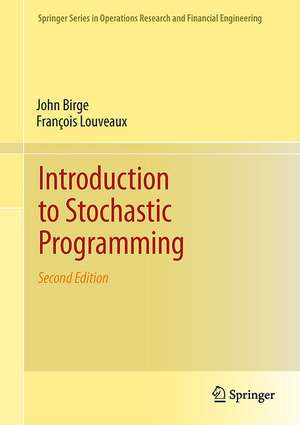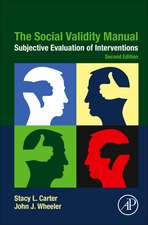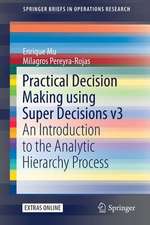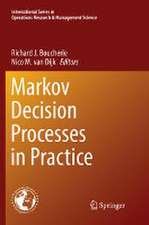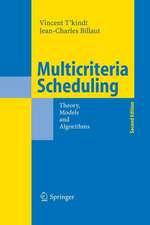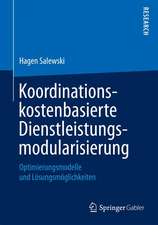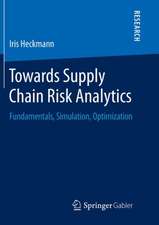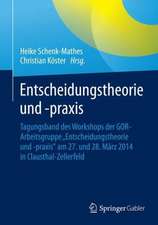Introduction to Stochastic Programming: Springer Series in Operations Research and Financial Engineering
Autor John R. Birge, François Louveauxen Limba Engleză Hardback – 27 iun 2011
In this extensively updated new edition there is more material on methods and examples including several new approaches for discrete variables, new results on risk measures in modeling and Monte Carlo sampling methods, a new chapter on relationships to other methods including approximate dynamic programming, robust optimization and online methods.
The book is highly illustrated with chapter summaries and many examples and exercises. Students, researchers and practitioners in operations research and the optimization area will find it particularly of interest.
Review of First Edition:
"The discussion on modeling issues, the large number of examples used to illustrate the material, and the breadth of the coverage make 'Introduction to Stochastic Programming' an ideal textbook for the area." (Interfaces, 1998)
| Toate formatele și edițiile | Preț | Express |
|---|---|---|
| Paperback (1) | 365.76 lei 3-5 săpt. | +37.30 lei 5-11 zile |
| Springer – 27 iun 2011 | 365.76 lei 3-5 săpt. | +37.30 lei 5-11 zile |
| Hardback (1) | 608.48 lei 6-8 săpt. | |
| Springer – 27 iun 2011 | 608.48 lei 6-8 săpt. |
Din seria Springer Series in Operations Research and Financial Engineering
-
 Preț: 497.00 lei
Preț: 497.00 lei - 13%
 Preț: 355.75 lei
Preț: 355.75 lei - 15%
 Preț: 365.76 lei
Preț: 365.76 lei - 17%
 Preț: 503.67 lei
Preț: 503.67 lei - 17%
 Preț: 363.08 lei
Preț: 363.08 lei -
 Preț: 347.47 lei
Preț: 347.47 lei - 17%
 Preț: 370.05 lei
Preț: 370.05 lei - 13%
 Preț: 357.53 lei
Preț: 357.53 lei -
 Preț: 356.91 lei
Preț: 356.91 lei - 19%
 Preț: 575.59 lei
Preț: 575.59 lei - 18%
 Preț: 945.30 lei
Preț: 945.30 lei - 20%
 Preț: 639.28 lei
Preț: 639.28 lei - 23%
 Preț: 732.07 lei
Preț: 732.07 lei -
 Preț: 384.48 lei
Preț: 384.48 lei - 15%
 Preț: 638.43 lei
Preț: 638.43 lei - 18%
 Preț: 740.57 lei
Preț: 740.57 lei - 18%
 Preț: 1395.63 lei
Preț: 1395.63 lei -
 Preț: 407.98 lei
Preț: 407.98 lei -
 Preț: 358.39 lei
Preț: 358.39 lei - 20%
 Preț: 549.58 lei
Preț: 549.58 lei - 18%
 Preț: 737.43 lei
Preț: 737.43 lei - 15%
 Preț: 660.37 lei
Preț: 660.37 lei -
 Preț: 411.67 lei
Preț: 411.67 lei -
 Preț: 405.06 lei
Preț: 405.06 lei -
 Preț: 391.02 lei
Preț: 391.02 lei - 18%
 Preț: 898.13 lei
Preț: 898.13 lei -
 Preț: 495.84 lei
Preț: 495.84 lei - 19%
 Preț: 526.97 lei
Preț: 526.97 lei -
 Preț: 391.02 lei
Preț: 391.02 lei -
 Preț: 392.97 lei
Preț: 392.97 lei - 15%
 Preț: 538.61 lei
Preț: 538.61 lei - 15%
 Preț: 880.15 lei
Preț: 880.15 lei - 24%
 Preț: 831.85 lei
Preț: 831.85 lei - 18%
 Preț: 837.15 lei
Preț: 837.15 lei - 18%
 Preț: 801.65 lei
Preț: 801.65 lei - 15%
 Preț: 637.28 lei
Preț: 637.28 lei - 19%
 Preț: 529.48 lei
Preț: 529.48 lei -
 Preț: 391.42 lei
Preț: 391.42 lei
Preț: 608.48 lei
Preț vechi: 715.86 lei
-15% Nou
Puncte Express: 913
Preț estimativ în valută:
116.47€ • 126.55$ • 97.90£
116.47€ • 126.55$ • 97.90£
Carte tipărită la comandă
Livrare economică 21 aprilie-05 mai
Preluare comenzi: 021 569.72.76
Specificații
ISBN-13: 9781461402367
ISBN-10: 1461402360
Pagini: 512
Ilustrații: XXV, 485 p.
Dimensiuni: 178 x 254 x 32 mm
Greutate: 1.1 kg
Ediția:2nd ed. 2011
Editura: Springer
Colecția Springer
Seria Springer Series in Operations Research and Financial Engineering
Locul publicării:New York, NY, United States
ISBN-10: 1461402360
Pagini: 512
Ilustrații: XXV, 485 p.
Dimensiuni: 178 x 254 x 32 mm
Greutate: 1.1 kg
Ediția:2nd ed. 2011
Editura: Springer
Colecția Springer
Seria Springer Series in Operations Research and Financial Engineering
Locul publicării:New York, NY, United States
Public țintă
GraduateCuprins
Introduction and Examples.- Uncertainty and Modeling Issues.- Basic Properties and Theory.- The Value of Information and the Stochastic Solution.- Two-Stage Recourse Problems.- Multistage Stochastic Programs.- Stochastic Integer Programs.- Evaluating and Approximating Expectations.- Monte Carlo Methods.- Multistage Approximations.- Sample Distribution Functions.- References.
Recenzii
From the reviews of the second edition:
“Help the students to understand how to model uncertainty into mathematical optimization problems, what uncertainty brings to the decision process and which techniques help to manage uncertainty in solving the problems. … certainly attract also the wide spectrum of readers whose main interest lies in possible exploitation of stochastic programming methodology and will help them to find their own way to treat actual problems using stochastic programming methods. As a whole, the three main building blocks of stochastic programming … are well represented and balanced.” (Jitka Dupačová, Zentralblatt MATH, Vol. 1223, 2011)
“Help the students to understand how to model uncertainty into mathematical optimization problems, what uncertainty brings to the decision process and which techniques help to manage uncertainty in solving the problems. … certainly attract also the wide spectrum of readers whose main interest lies in possible exploitation of stochastic programming methodology and will help them to find their own way to treat actual problems using stochastic programming methods. As a whole, the three main building blocks of stochastic programming … are well represented and balanced.” (Jitka Dupačová, Zentralblatt MATH, Vol. 1223, 2011)
Notă biografică
John R. Birge, is a Jerry W. and Carol Lee Levin Professor of Operations Management at the University of Chicago Booth School of Business. François Louveaux is a Professor at the University of Namur(FUNDP) in the Department of Business Administration
Textul de pe ultima copertă
The aim of stochastic programming is to find optimal decisions in problems which involve uncertain data. This field is currently developing rapidly with contributions from many disciplines including operations research, mathematics, and probability. At the same time, it is now being applied in a wide variety of subjects ranging from agriculture to financial planning and from industrial engineering to computer networks. This textbook provides a first course in stochastic programming suitable for students with a basic knowledge of linear programming, elementary analysis, and probability. The authors aim to present a broad overview of the main themes and methods of the subject. Its prime goal is to help students develop an intuition on how to model uncertainty into mathematical problems, what uncertainty changes bring to the decision process, and what techniques help to manage uncertainty in solving the problems.
In this extensively updated new edition there is more material on methods and examples including several new approaches for discrete variables, new results on risk measures in modeling and Monte Carlo sampling methods, a new chapter on relationships to other methods including approximate dynamic programming, robust optimization and online methods.
The book is highly illustrated with chapter summaries and many examples and exercises. Students, researchers and practitioners in operations research and the optimization area will find it particularly of interest.
Review of First Edition:
"The discussion on modeling issues, the large number of examples used to illustrate the material, and the breadth of the coverage make 'Introduction to Stochastic Programming' an ideal textbook for the area." (Interfaces, 1998)
In this extensively updated new edition there is more material on methods and examples including several new approaches for discrete variables, new results on risk measures in modeling and Monte Carlo sampling methods, a new chapter on relationships to other methods including approximate dynamic programming, robust optimization and online methods.
The book is highly illustrated with chapter summaries and many examples and exercises. Students, researchers and practitioners in operations research and the optimization area will find it particularly of interest.
Review of First Edition:
"The discussion on modeling issues, the large number of examples used to illustrate the material, and the breadth of the coverage make 'Introduction to Stochastic Programming' an ideal textbook for the area." (Interfaces, 1998)
Caracteristici
Well-paced and wide-ranging introduction to this subject Prime goal is to help students develop an intuition on how to model uncertainty into mathematical problems Provides a first course in stochastic programming suitable for students Includes supplementary material: sn.pub/extras
